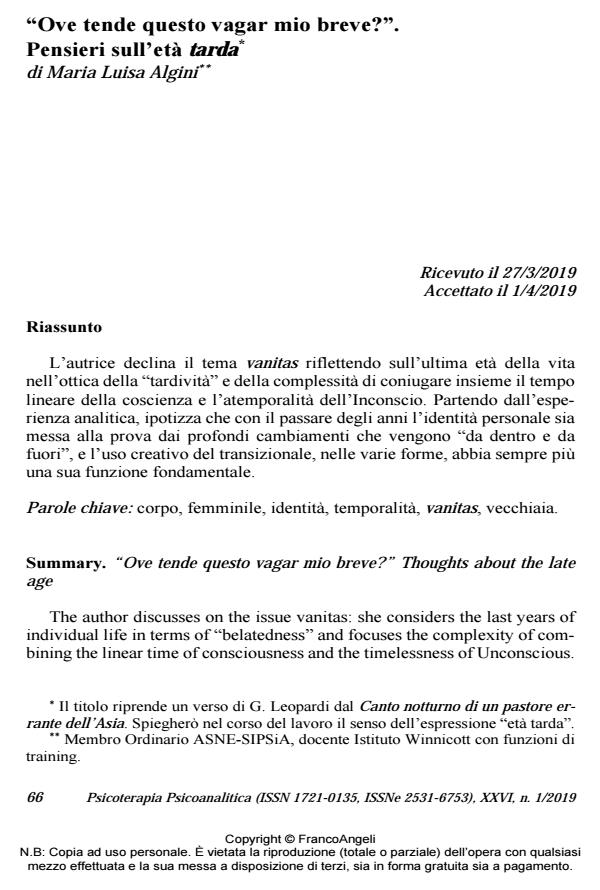"Ove tende questo vagar mio breve?"Thoughts about the late age
Journal title PSICOTERAPIA PSICOANALITICA
Author/s Maria Luisa Algini
Publishing Year 2019 Issue 2019/1
Language Italian Pages 16 P. 66-81 File size 189 KB
DOI 10.3280/PSP2019-001005
DOI is like a bar code for intellectual property: to have more infomation
click here
Below, you can see the article first page
If you want to buy this article in PDF format, you can do it, following the instructions to buy download credits

FrancoAngeli is member of Publishers International Linking Association, Inc (PILA), a not-for-profit association which run the CrossRef service enabling links to and from online scholarly content.
The author discusses on the issue vanitas: she considers the last years of individual life in terms of "belatedness" and focuses the com-plexity of combining the linear time of consciousness and the time-lessness of Unconscious. On the base of her analytic experience, the A. assumes that the deep "from-inside and from-outside" changes challenge the individual identity and that the creative and varied use of transitional area has an increasingly primary task.
Keywords: Body, feminine, identity, temporality, vanitas, old age.
- Algini M.L. (2010). Le vie ostinate della creatività. Psicoterapia Psicoanalitica, XVII, 1: 101-111.
- Algini M.L. (2011). Il tempo dell’orizzonte corto. Sull’amore e il lutto. Torino: Robin.
- Algini M.L. (2017). Sono ancora i “fantagenitori”? Piccolo viaggio tra i nonni di oggi. Interazioni, 1/45: 79-94.
- Chatwin B. (1987). Le vie dei canti. Milano: Adelphi, 1988.
- De Luca E. (1996). Kohelet, Ecclesiaste. Milano: Feltrinelli.
- Di Bella E. (2005). Se gioventù sapesse, se vecchiaia potesse. In: Lugones M., Algini M.L, Paura del futuro. Quaderni di psicoterapia infantile, 50, 162-179. Roma: Borla.
- Freud S. (1919). Il perturbante. O.S.F., 9.
- Freud S. (1920). Al di là del principio di piacere. O.S.F., 9.
- Freud S. (1932). Lezione 31: La scomposizione della personalità psichica. O.S.F., 11.
- Green A. (1993). Il lavoro del negativo. Roma: Borla, 1996.
- Kaës R. (2002). La costruzione dell’identità in correlazione all’alterità e alla differenza. Psiche, 1: 185-195.
- Kaës R. (2005). Il futuro in eredità. Un rovesciamento della prospettiva intergenerazionale a proposito del complesso del nonno. In: Lugones M., Algini M.L, Paura del futuro. Quaderni di psicoterapia infantile, 50, 27-42. Roma: Borla.
- Leopardi G. Canto notturno di un pastore errante dell’Asia. I Meridiani: Poesie. Milano: Mondadori, 1996.
- Milner M. (1987). L’alba dell’eternità. Roma: Borla, 1990.
- Said E.W. (2006). Sullo stile tardo. Milano: Il Saggiatore, 2009.
- Talpin J.M. et al. (2005). Cinq paradigmes cliniques du vieillissement. Paris: Dunod.
- Woolf V. (1998). Una signora nello specchio. Un riflesso. In: Meridiani: Saggi, Prose, Racconti. Milano: Mondadori.
Maria Luisa Algini, "Ove tende questo vagar mio breve?". Pensieri sull’età tarda in "PSICOTERAPIA PSICOANALITICA" 1/2019, pp 66-81, DOI: 10.3280/PSP2019-001005